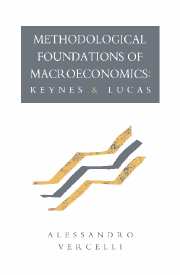Book contents
- Frontmatter
- Contents
- Preface
- List of abbreviations
- 1 Introduction
- Part 1 Methodological foundations of macroeconomics
- 2 Equilibrium, disequilibrium and economic theory
- 3 Dynamic instability and economic models
- 4 Structural instability and economic change
- 5 Uncertainty, predictability and flexibility
- 6 Rationality and expectations
- 7 Probabilistic causality and economic analysis: Suppes, Keynes, Granger
- Part II Keynes after Lucas
- References
- Subject index
- Author index
7 - Probabilistic causality and economic analysis: Suppes, Keynes, Granger
Published online by Cambridge University Press: 05 January 2012
- Frontmatter
- Contents
- Preface
- List of abbreviations
- 1 Introduction
- Part 1 Methodological foundations of macroeconomics
- 2 Equilibrium, disequilibrium and economic theory
- 3 Dynamic instability and economic models
- 4 Structural instability and economic change
- 5 Uncertainty, predictability and flexibility
- 6 Rationality and expectations
- 7 Probabilistic causality and economic analysis: Suppes, Keynes, Granger
- Part II Keynes after Lucas
- References
- Subject index
- Author index
Summary
As our knowledge is partial, there is constantly, in our use of the term cause, some reference implied or expressed to a limited body of knowledge.
(Keynes, TP, p. 306)Introduction
At the root of the modern notions of causality in economics we find authors like Keynes, who often used causal concepts in developing his economic arguments, and Tinbergen, who gave a version of ‘process analysis’ particularly suitable for a causal analysis. A crucial step for working out a notion of causality rigorous and general enough for economic analysis was taken in the late forties and early fifties when causality was redefined in the language of matrix algebra which was to find a widespread application in economics. A seminal contribution in this direction came from Goodwin (1947), who was able to clarify the relation between ‘unilateral coupling’, as he preferred to call what would later be called a ‘causal relation’, and the formal properties of matrices necessary to express it. This contribution inspired the papers written in the early fifties by Simon (1952, 1953, 1954), who adopted an explicitly causal language referring openly to the philosophical literature on causality. Simon's conception of causality rapidly became the most influential notion of causality in economics, and remained so until very recently. Its dominance was challenged only much later by the conception worked out by Granger (1963, 1969, 1980) and developed by Sims (1972, 1977). This conception has been found congenial by many new classical economists trying to undo the Keynesian revolution, while that of Simon has often been favoured by Keynesian economists. Concepts of causality are thus crucially involved in the current lively debate on the foundations of macroeconomics.
- Type
- Chapter
- Information
- Methodological Foundations of MacroeconomicsKeynes and Lucas, pp. 106 - 124Publisher: Cambridge University PressPrint publication year: 1991
- 2
- Cited by



